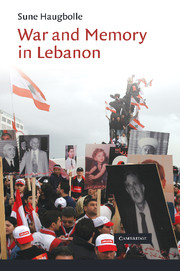Book contents
- Frontmatter
- Contents
- Figures
- Acknowledgments
- Note on Transliteration
- Acronyms
- War and Memory in Lebanon
- Prologue: A Hiatus of History
- 1 Remembering a War of Selves and Others
- 2 Culture, Politics, Civil War
- 3 Discourses on Amnesia and Reconstruction: Memory in the 1990s
- 4 Nostalgias
- 5 Inside Violence
- 6 Sectarian Memory Cultures
- 7 Truth Telling in the Independence Intifada
- Conclusion
- Bibliography
- Index
- Titles in the series
2 - Culture, Politics, Civil War
Published online by Cambridge University Press: 05 May 2010
- Frontmatter
- Contents
- Figures
- Acknowledgments
- Note on Transliteration
- Acronyms
- War and Memory in Lebanon
- Prologue: A Hiatus of History
- 1 Remembering a War of Selves and Others
- 2 Culture, Politics, Civil War
- 3 Discourses on Amnesia and Reconstruction: Memory in the 1990s
- 4 Nostalgias
- 5 Inside Violence
- 6 Sectarian Memory Cultures
- 7 Truth Telling in the Independence Intifada
- Conclusion
- Bibliography
- Index
- Titles in the series
Summary
Historical Memory and the Consumption of Modernity
Lebanon's status as an anomaly among Arab countries is often ascribed to the ‘freedom’ or ‘openness’ of Lebanese society and politics (Johnson 2001: 218–26). No other Arab country is as culturally and religiously diverse, and in no other Arab country has the diversity of society expressed itself as freely as in Lebanon. The public sphere is more open than in other Arab countries in the sense that all religious groups are allowed political representation, and that freedom of speech, association and artistic expression has been better protected here than elsewhere. Some blame the civil war on this very freedom and openness. Lebanon, these critics say, lacked a strong state based on national unity and therefore got caught too easily in the power games of its larger neighbours. Lebanon was, as the Moroccan novelist Tahar Ben Jelloun has put it, an Arab experiment in freedom that was defeated (Khairallah 2001: 515).
Attempts in the postwar period to come to terms with the civil war were often formulated in the context of reinstating Lebanon as a uniquely privileged space for openness, tolerance and free public debate. This mythologised understanding of history begs the question: To what extent was Lebanon open and free before the war? And how did the war change it? That is important to understand not just to deconstruct openness as a central tenet of postwar memory discourse.
- Type
- Chapter
- Information
- War and Memory in Lebanon , pp. 29 - 63Publisher: Cambridge University PressPrint publication year: 2010

